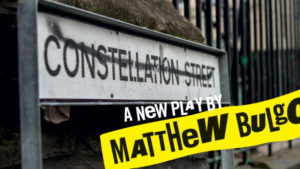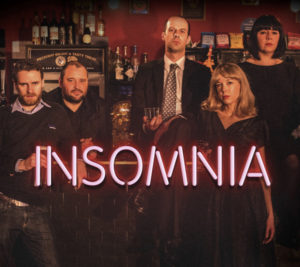A set of four intertwining monologues dividing tight – and tightly packed – spaces in a pub theatre tucked underneath the train stations – literally hidden gem.
Hardly a setup for convention.That, for the audience, is sublime.
The set design by the obviously talented Amy Jane Cook, catches you immediately, as you’re led through Constellation Street. The sets, three internal sets each toe the line between intimacy and claustrophobia just as the street itself does; a fifth character illuminated by its cast, the staging, and the experience theatre the play provides. The multiple sets were all done brilliantly but didn’t take the balance off the play itself. The outside platform fits perfectly; the noise of Cardiff against its backdrop illuminating rather than distracting; a brilliantly designed set up that draws subjective meaning without ever prompting it unsubtly.
This set up perfectly captures the mix of realism and delirium imbued in the play; the smallest pieces of the everyday evolving into a smooth hallucination between reality and melodrama. The play is flawlessly cast, each delivering their characters believably, and essentially, ambiguously. Each monologue in itself invites a wealth of interpretation, and the contradictions between them made for a more interesting whole; turning to pin point lies and honesty, or if indeed, they are even mutually exclusive at all. Distrust and uncertainty were the stars of the script, crawling under the skin the most effectively.
Tonally, the play was dark without nihilism, realism providing the comedy. Narratively, it could veer dangerously close to artifice; interweaving of monologues a little predictable at times, but with the cast and this experiential, experimental play nevertheless not straying from its basis in character, its brevity seemed at once a loss and a basis of its charms and wit. In its intimacy, the stories packed weight, but, because of its root in subjectivity were not always as deeply felt. We are dragged into the confusion, loss and grief of the characters, rooted in their street but projected through to any other. Although narratively slick, the close web of all the characters seemed to displace it from an every town, an idea the play needs to pack the punches it delivered, more lastingly for its audience.
One idea in particular, maybe from just seeing three of four monologues, was that one interesting idea seemed left to flounder. Parts were resonant, parts were shocking;but although technically brilliant, it never seemed to project itself onto the outside world. Perhaps, I must concede, the intention for us ‘invaders’ on the street.
It’s not that there was style over substance, but merely that the substance is felt harder to relate to in an outside context because of the stylistic excellence. As a piece of event theatre with the atmosphere of a clandestine treat, it is a must-see, but it’s genuine emotional resonance, or at least the extent of its power, is an ambiguous thing; as hard to track as the characters it writes of.


